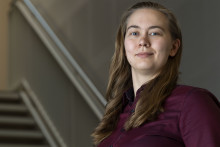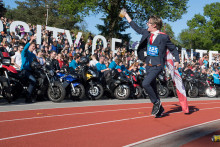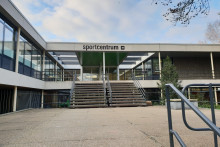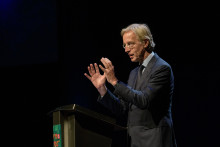During next week, two ‘weeklong experiences’ take place. There is an art exhibition from March 4th to March 7th in Ravelijn, including the work of renowned Dutch glass artist Annemiek Punt. Spacebar, in the Enschede city centre, hosts another art exhibition.
From March 6th to March 8th, there will be an exposition in the ‘diagonal’ of Carré, focusing more on the theme in a UT perspective. ‘It involves a photo exposition of women and the UT and science revolving around women’s health for instance’, says Verena Menzel, one of the main organisers on behalf of P-NUT working group called EQUITY.
There is also a Studium Generale lecture on Tuesday evening, focused on male stereotypes in movies. And Amnesty Utwente is organising a march in the city centre on Friday.
‘Feel free to disagree’
The activities are organised by eight different initiatives within the UT. ‘All with a focus on feminism’, explains Menzel. ‘This collaboration, ranging from students to support staff to senior academics, is similar to last year. So that has fortunately passed the test of time.’
The activities are somewhat different however. Important this year was to lower the threshold and offer a focused programme, says Menzel. ‘Last year, we had a lot of different events spread out over the week. But attendance was very dependent on people’s availability at those specific times and dates. And we noticed that we attracted people who were primarily interested in the theme anyway.’
That’s a misconception surrounding International Women’s Day that Menzel wants to avoid at all cost. ‘Although the name might suggest otherwise, International Women’s Day is for everyone. It’s also important that critical voices join the conversation – that includes white male engineering students for instance. Just stop by and feel free to disagree, that’s the only way to move forward.’
Celebration and call to action
According to Menzel, International Women’s Day is both ‘a celebration and a call to action’. ‘In an ideal situation, when everything is fair and equitable, we may not even need an International Women’s Day. But I would still like to celebrate how far we’ve already come with regards to feminism, both globally and at the UT.’
But there is still a long way to go, adds the PhD candidate. ‘There are still issues like equal pay, inclusion and accessibility and the leaky pipeline – the higher the academic position, the less women can be found in those positions.’ Menzel notes that it’s unrealistic to expect major changes from an individual. ‘But if we are all open-eyed in our daily life, there are plenty of things that can be improved. Like the free period products on campus, or the all-gender toilets. The UT can also put more effort in more inclusive job vacancies. It’s hard for an individual to change the big system, but we can all take small steps.’







